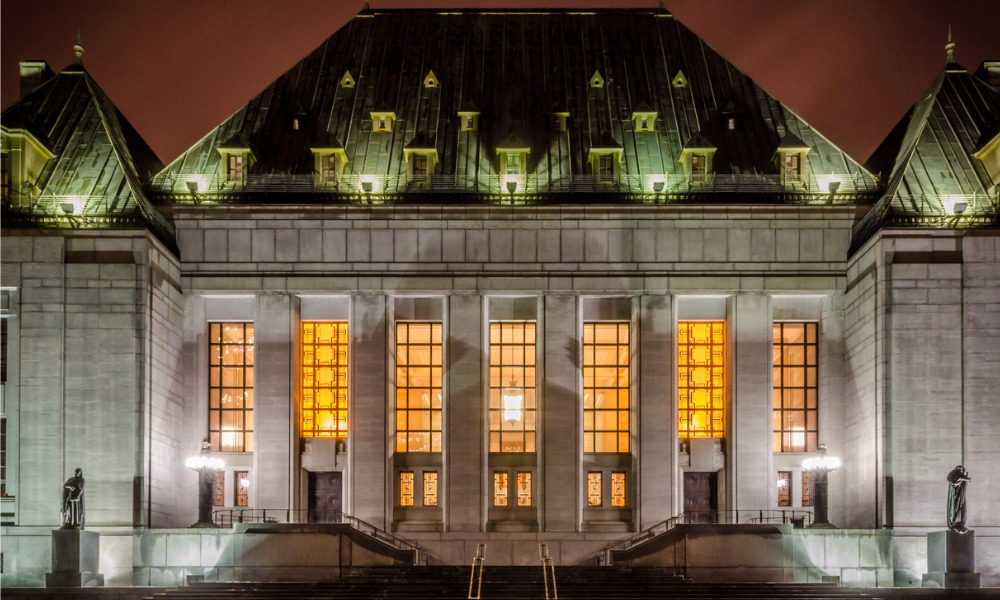COVID-19 took its toll, with decisions issued by high court less than in more than a decade

The Supreme Court of Canada heard far fewer appeals last year than it did in 2019, just 41 compared to the 69 it had heard the previous year, according to its recently released its 2020 Year in Review. In fact, it heard the lowest number of appeals for more than a decade.
The pandemic had an impact on the number of cases heard by the court, says Renée Thériault, Executive Legal Officer of the Supreme Court, with “relatively few cases that had all documents filed and that were ready for hearing in the first half of the year.”
Just 12 appeals were heard between January and June 2020; by contrast, in 2021, the court has heard 21 appeals, and will hear nine more in May for a total of 30 appeals for the same time period, she notes.
Due to the outbreak of COVID-19 last year, which was declared a pandemic in March, the Supreme Court decided that month to postpone all its scheduled hearings in March, April and May, and to reschedule those hearings via videoconference starting in June and continuing in September and October.
The court has not experienced a backlog, says Thériault, either in respect to deciding on applications for leave to appeal, or the hearing of cases.
“In the case of the former,” she says, “they are now decided entirely electronically, which has allowed the court to maintain its usual pace throughout the pandemic. And regarding the latter, the court has been hearing cases since last June in what is now an entirely re-configurated courtroom, adapted to meet the requirements of health officials, with members of the court physically in the courtroom hearing counsel who appear before them via Zoom.”
From June 9 to 12 the court held its first fully online hearings.
The federal carbon tax case, References re Greenhouse Gas Pollution Pricing Act, was heard in a special session in the court in late September, with the bench extended to the floor to ensure physical distancing, and clear barriers installed between the judges and elsewhere in the courtroom. With the judges present in the courtroom, some lawyers appeared in person while others appeared by video; the extraordinary number of interveners necessitated the hearings being held in person.
The greater impact of the pandemic is on the trial courts, Thériault notes, which “ultimately impacts our numbers, especially in terms of applications for leave.”
The Supreme Court received just 471 complete leave applications in 2020, down from 525 in 2019, and granted just 28 applications compared to 36 the previous year, according to the annual review, which includes information about its decisions, statistical trends and activities over the year. It issued 45 decisions (deciding 46 cases) in 2020 – including four from the bench -- compared to 67 decisions (deciding 72 cases) in 2019.
The Supreme Court also wants to set a good example for other courts, says Eugene Meehan, a former Supreme Court executive legal officer and partner in Ottawa-based Supreme Advocacy LLP, “and under Chief Justice Wagner [it] is particularly sensitive to ensuring there be no backlogs. The lower number of leaves and appeals are due in part to the pandemic slowdown, but also in part to the court being careful about managing its docket.”
Part and parcel of the Supreme Court’s strategy is to carefully manage its resources, says Meehan, who notes that in the past year “we’ve also seen the court ruling on many appeals, especially as of right appeals, from the bench. . . . Fewer lengthy decisions on as of right appeals might mean more resources available for cases that are granted leave as a result of raising issues of public importance.”
Delivering justice in 2020
Long before COVID-19, “Canada’s courts were plagued with deficiencies such as backlogs and delays,” Chief Justice Richard Wagner wrote in his message in the 2020 Year in Review. “They required resources and upgrades. Courts were slow to adopt modern methods and tools for working. The pandemic gave all parties no choice but to confront these realities. In 2019, the Supreme Court of Canada celebrated holding hearings outside Ottawa for the first time. In 2020, we marked the unexpected milestone of holding hearings online.”
Chief Justice Wagner has also worked with Minister of Justice David Lametti to establish an Action Committee on Court Operations in response to COVID-19, which provides guidance to all provinces and territories on how to restore the full operation of Canada’s courts while keeping staff and court users safe.
The court emphasized that access to justice had continued, with courts across Canada allowing urgent matters to proceed through remote hearings.
And the public may connect to the court through watching scheduled hearings live on its website, watching them through the archives, following its updates on Facebook and Twitter, and by taking a remote guided tour of the court, launched on July 2 in the wake of in-person tours being temporarily halted.
A landmark judgment
In June the court issued its decision in Conseil scolaire francophone de la Colombie-Britannique v. British Columbia, which affirmed that children who study in English or French should get the same quality of education, and found that eight B.C. communities should get French-language schools. The decision note the importance of schools in preserving the language and culture of official-language minorities. Under Section 23 of the Charter, students have the right to attend school in English or French, even when it’s not the main language of the province or territory they study in.
The case was heard while the Supreme Court was sitting in Winnipeg in September 2019, the first time in its history that it had sat outside of Ottawa.










